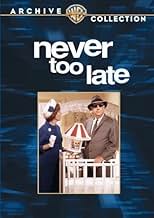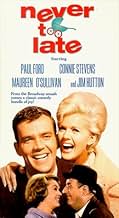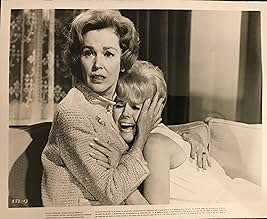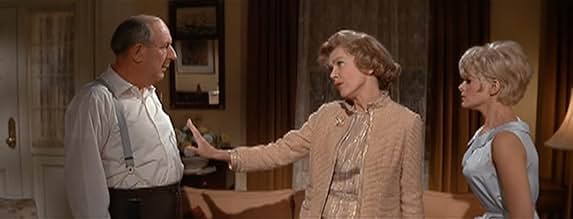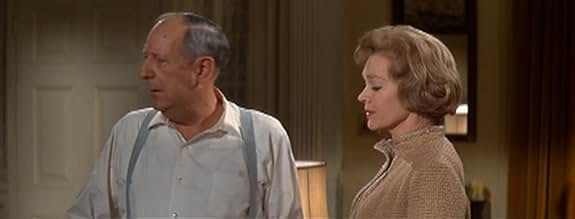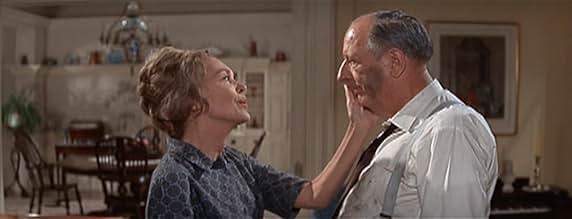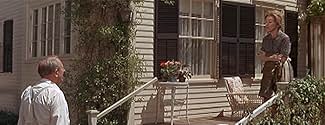Adicionar um enredo no seu idiomaFifty-something Edith Lambert is thrilled to find out that she's expecting a baby, but her husband Harry is less enthusiastic.Fifty-something Edith Lambert is thrilled to find out that she's expecting a baby, but her husband Harry is less enthusiastic.Fifty-something Edith Lambert is thrilled to find out that she's expecting a baby, but her husband Harry is less enthusiastic.
- Prêmios
- 1 indicação no total
Michael Abelar
- Lumberyard Man
- (não creditado)
Lou Bernard
- Lumberyard Man
- (não creditado)
Robert Biheller
- Young Husband
- (não creditado)
Ted Blair
- Lumberyard Man
- (não creditado)
Gino Cappelletti
- Lumberyard Man
- (não creditado)
Charles Dornan
- Surveyer
- (não creditado)
Johnny Eimen
- Boy
- (não creditado)
Tommy Farrell
- Fred Ainsley
- (não creditado)
Jesslyn Fax
- Saleswoman
- (não creditado)
Pamelyn Ferdin
- Little Girl in Elevator
- (não creditado)
John Francis
- Plumber
- (não creditado)
Avaliações em destaque
Since this film followed a successful Broadway play, I can only conclude that the play must have been funnier. I found Paul Ford's character completely repugnant. He is a blowhard who has no appreciation for anyone around him. This is supposed to be hilarious but I just found it irritating and sad. The idea that a lovely, charming woman like Maureen O'Sullivan would be married to the crude, unattractive Paul Ford strains credulity. Not the fault of the actor - he is very funny in other movies - it is instead the result of the hostile screenplay.
Before Bud Yorkin and Norman Leer shot to fame for films such as "Start the Revolution Without Me" or TV shows like "All in the Family", they had a big stage success with "Never Too Late". And, unlike most Broadway shows that make it to the big screen, the starts of the play, Paul Ford and Maureen O'Sullivan, starred in BOTH!
The story is very simple. Edith is in her 50s and finds herself pregnant. However, oddly, her husband just seems to be in a very foul mood throughout the film...complaining about pretty much everything! You'd think he'd be happy and initially shocked...but his reaction just seemed bizarre and inappropriate. And, speaking of inappropriate, when the daughter and her husband hear about it, suddenly the daughter (Connie Stevens) insists she also wants a baby and her husband (Jim Hutton) also then spends the rest of the film complaining! And, after a while, I just got tired of it!
While the story is fun, at least initially, it just didn't seem the least bit realistic nor enjoyable. Yelling isn't comedy...and this is pretty much yelling from start to finish. It has some good moments here and there...but overall it left me flat.
By the way, if you watch the film, notice that they never use the word 'toilet' in the scene with the toilet. They also act as if it's something unmentionable. Too weird.
The story is very simple. Edith is in her 50s and finds herself pregnant. However, oddly, her husband just seems to be in a very foul mood throughout the film...complaining about pretty much everything! You'd think he'd be happy and initially shocked...but his reaction just seemed bizarre and inappropriate. And, speaking of inappropriate, when the daughter and her husband hear about it, suddenly the daughter (Connie Stevens) insists she also wants a baby and her husband (Jim Hutton) also then spends the rest of the film complaining! And, after a while, I just got tired of it!
While the story is fun, at least initially, it just didn't seem the least bit realistic nor enjoyable. Yelling isn't comedy...and this is pretty much yelling from start to finish. It has some good moments here and there...but overall it left me flat.
By the way, if you watch the film, notice that they never use the word 'toilet' in the scene with the toilet. They also act as if it's something unmentionable. Too weird.
Crotchety Harry Lambert (Paul Ford) owns a small lumber yard. He is not happy with his new-thinking employee son-in-law Charlie Clinton (Jim Hutton). He is pushing his daughter Kate (Connie Stevens) to start a family. His wife Edith (Maureen O'Sullivan) receives surprising news. She's pregnant.
It's a fun concept especially for the older couple. It's based on a 1962 play. The younger couple is a little off. They are playing more immature especially Connie Stevens. She's in her late twenties. The character plays more early twenties. Charlie shows that he's forward thinking early on, but he retreats back to the 50's. The younger couple is more annoying than funny. The two couples are far too similar. I kept thinking of Norman Lear doing All in the Family. I like the first half a lot. The second half takes a couple of awkward turns where it could funny but somehow it's not that funny. It becomes a bit too angry without the humor.
It's a fun concept especially for the older couple. It's based on a 1962 play. The younger couple is a little off. They are playing more immature especially Connie Stevens. She's in her late twenties. The character plays more early twenties. Charlie shows that he's forward thinking early on, but he retreats back to the 50's. The younger couple is more annoying than funny. The two couples are far too similar. I kept thinking of Norman Lear doing All in the Family. I like the first half a lot. The second half takes a couple of awkward turns where it could funny but somehow it's not that funny. It becomes a bit too angry without the humor.
... as this film clearly demonstrates. This is a cute little film about a 50 year old woman (Maureen O'Sullivan) and her 60 year old husband (Paul Ford) who find out they are going to be parents a second time. Their first and only child is a 25 year old married daughter (Connie Stevens) who, along with her 27-year old husband, lives with her parents in their large home. Her husband works for her father in his lumber supply business. This was produced by the team of Norman Lear and Bud Yorkin, and you can't help but feel they were warming up for "All in the Family" with this one, there are so many similarities. The middle-aged wife is named Edith, and prior to the pregnancy being discovered, she is running around the home at a manic pace doing housework. The son-in-law is constantly being kicked around and disrespected by his father-in-law, and the daughter is constantly bursting into tears and becoming hysterical. All that's missing is the social commentary of All in the Family.
Maureen O'Sullivan's character feels a new-found pride and femininity in her condition. Ford's character, however, is embarrassed beyond belief. After all, it proves at their advanced age they're still having sex! What's worse, they live in a small New England town where everyone knows them and stops and stares at them on the street. The grown daughter is unhappy because at the tender age of 25 she has to grow up. Mom is too old to be keeping such a large house in her condition and now it is the daughter's turn to do the cooking, the cleaning, etc. No more sleeping late, handing her dirty laundry to mom, and heading off for an afternoon of tennis. Her solution - if she gets pregnant too, her cheapskate father will have to spring for a paid housekeeper.
Sure, many of the values demonstrated here are quite dated and even sexist, but it's a cute romp with lots of humor, and who would ever have thought that the 60's could be looked back upon with nostalgia as a simpler time. Well, in this film they can be.
Maureen O'Sullivan's character feels a new-found pride and femininity in her condition. Ford's character, however, is embarrassed beyond belief. After all, it proves at their advanced age they're still having sex! What's worse, they live in a small New England town where everyone knows them and stops and stares at them on the street. The grown daughter is unhappy because at the tender age of 25 she has to grow up. Mom is too old to be keeping such a large house in her condition and now it is the daughter's turn to do the cooking, the cleaning, etc. No more sleeping late, handing her dirty laundry to mom, and heading off for an afternoon of tennis. Her solution - if she gets pregnant too, her cheapskate father will have to spring for a paid housekeeper.
Sure, many of the values demonstrated here are quite dated and even sexist, but it's a cute romp with lots of humor, and who would ever have thought that the 60's could be looked back upon with nostalgia as a simpler time. Well, in this film they can be.
In those early Sixties Kennedy years this play and film were big hits with an across the board appeal to generations, but particularly the senior citizen crowd. Paul Ford and Maureen O'Sullivan who repeated their roles from the 1007 performance run Broadway play show that those thought past their prime can still do some things totally unexpected.
Menopause was late coming in the Lambert household of Concord, Massachusetts because Maureen O'Sullivan has announced after a 20 year span after the birth of her daughter Connie Stevens that she is pregnant again. She and Paul Ford are about to be parents again at an age when they should be expecting their first grandchildren. That is of particular interest to Connie Stevens and her husband Jim Hutton who are trying ever so hard to get Connie in a family way.
But in general Ford who is a conservative man by nature is getting all kinds of Ooohs and Ahs from the town for his unexpected virility. His neighbor and rival Lloyd Nolan who is the mayor of the town is really ribbing him something awful.
Sight gags abound in Never Too Late usually involving Ford and his middle age paunch. There's a scene in the pediatric waiting room where Ford is sitting with a bunch of young fathers to be. There's another one in an elevator with Ford and a little girl and some pregnant women with the young girl drawing all kinds of conclusions.
In the non-visual category Ford and Hutton both really tie one on and a bit of truth telling emerges from the booze.
I remember seeing this in the theater back when it first came out and the timeless family situations make Never Too Late as fresh as it was when I first saw it. This could get a remake today and not lose a thing. But until then this fine version will suffice.
Menopause was late coming in the Lambert household of Concord, Massachusetts because Maureen O'Sullivan has announced after a 20 year span after the birth of her daughter Connie Stevens that she is pregnant again. She and Paul Ford are about to be parents again at an age when they should be expecting their first grandchildren. That is of particular interest to Connie Stevens and her husband Jim Hutton who are trying ever so hard to get Connie in a family way.
But in general Ford who is a conservative man by nature is getting all kinds of Ooohs and Ahs from the town for his unexpected virility. His neighbor and rival Lloyd Nolan who is the mayor of the town is really ribbing him something awful.
Sight gags abound in Never Too Late usually involving Ford and his middle age paunch. There's a scene in the pediatric waiting room where Ford is sitting with a bunch of young fathers to be. There's another one in an elevator with Ford and a little girl and some pregnant women with the young girl drawing all kinds of conclusions.
In the non-visual category Ford and Hutton both really tie one on and a bit of truth telling emerges from the booze.
I remember seeing this in the theater back when it first came out and the timeless family situations make Never Too Late as fresh as it was when I first saw it. This could get a remake today and not lose a thing. But until then this fine version will suffice.
Você sabia?
- CuriosidadesTimothy Hutton, son of Jim Hutton, made his first screen appearance in this movie as the little boy who runs to his father.
- Erros de gravaçãoLate in the movie, after the "drunken fight" scene when Edith tells Harry "it's not true", a portable phonograph (record player) sitting on a table alternates between being crooked on the table and being aligned with the table edge.
- Citações
Charlie Clinton: A lot of people hate you. What's that got to do with it? Look, if the city needs lumber, it might as well be ours.
Harry M. Lambert: Just what do you mean by a lot of people hate me?
- ConexõesReferenced in What's My Line?: Maureen O'Sullivan (1965)
- Trilhas sonorasNever Too Late
Music by David Rose
Lyrics by Jay Livingston and Ray Evans
Sung by Vic Damone during the opening credits
Played often in the score
Principais escolhas
Faça login para avaliar e ver a lista de recomendações personalizadas
- How long is Never Too Late?Fornecido pela Alexa
Detalhes
- Tempo de duração1 hora 45 minutos
- Mixagem de som
- Proporção
- 2.35 : 1
Contribua para esta página
Sugerir uma alteração ou adicionar conteúdo ausente

Principal brecha
By what name was Never Too Late (1965) officially released in India in English?
Responda

